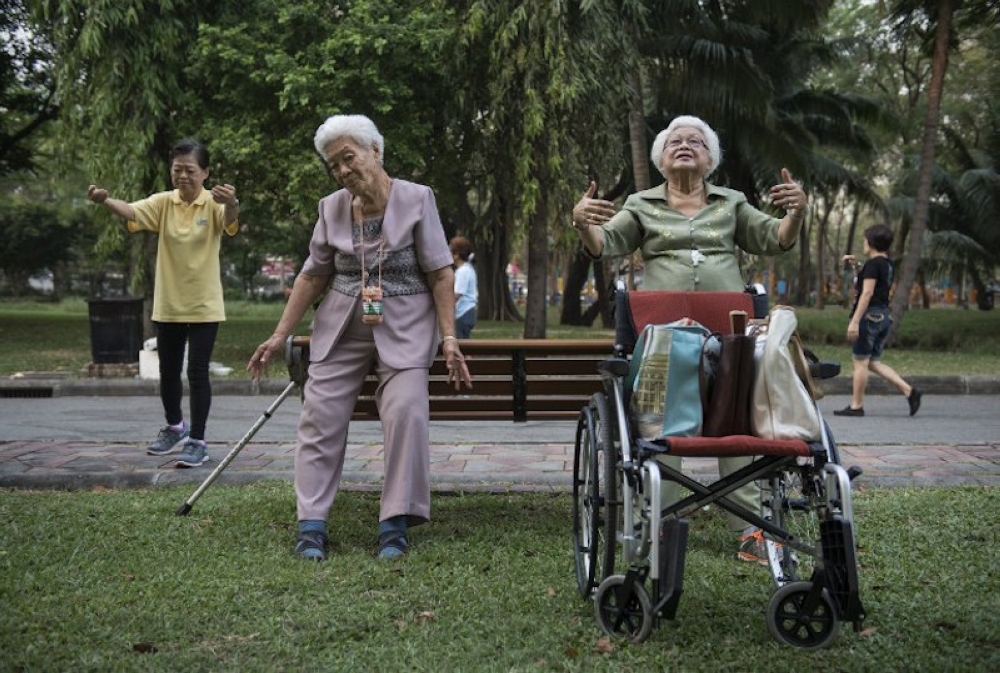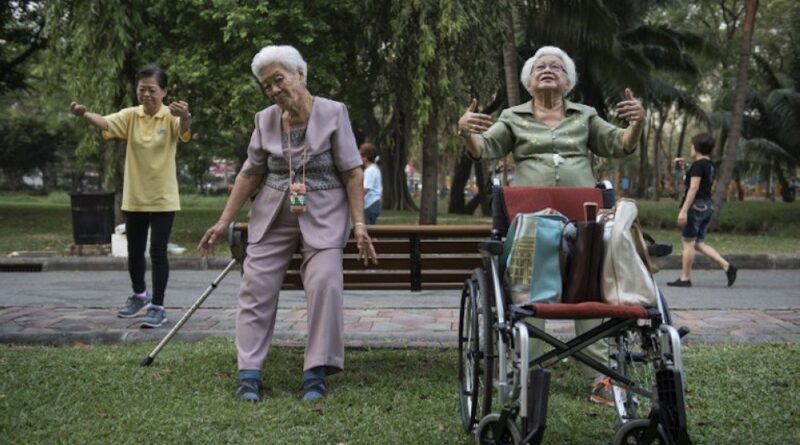In the name of health: What can we do as children to help our elderly parent move? (And don’t be a ‘careless parent’)
TODAY reporter Kong Kit Yan shares: Why my mother avoided exercise despite her health problems – and how I found the key to motivating her.
SINGAPORE, Aug 11 – When my mother had to undergo two surgeries after she experienced numbness in her right hand, I started encouraging her to exercise to save her life. good and improve the quality of his life.
This desire intensified when he began to struggle with basic movements, such as sitting down and standing, due to knee pain.
Every time we talked about hiking or going to nature reserves, he would say: “I can’t do things like this anymore.” My knee will hurt.”
I would answer each time: “That’s why you should start exercising. It will help you with knee pain. ”
However, despite my mother accepting my advice with a sigh of resignation, our discussions did not lead to action.
It was not unexpected at all. I have heard from my friends how difficult it can be to convince their parents to get out of their comfort zone, whether it be to exercise, go to the doctors or enjoy socializing.
A friend even told me that his father doesn’t believe in health checks because “if it’s my time to go, it’s my time to go”.
What can we do as their children about this?
Do our parents need to be forced, just like my mother once “forced” me to take piano lessons when I was a child because she thought it would be good for me?
I sought advice from physical therapists and personal trainers who specialize in adults, hoping to find a way to start my mother on a pain management regime and help my friends encourage their parents to do the same.
Understand their concerns
Talking to several trainers, I learned that older people often know the importance of staying active.
However, there may be things like limited mobility, difficulties getting to the venue due to distance or lack of accessibility such as lifts or ramps, and lack of free time to participate in activities due to other commitments such as caring for others. their spouses or grandchildren.
Psychologically, there is a fear of injury.
Adults with idiosyncratic personalities also tend to find group activities unpleasant or difficult.
Melissa Heng of Thrive Healthcare, a firm specializing in physiotherapy and rehabilitation, said that such fear can reduce the self-confidence of older people and prevent them from taking that first step.
Alfred Yaap, head fitness trainer at NTUC Health’s Senior Gym, said many seniors who were unemployed or living a self-sufficient life may not know where to start.
And for those with chronic conditions like diabetes, high blood pressure or osteoarthritis, they may not be sure how to exercise safely without aggravating joint pain. , for example.
“Many of them would benefit from an exercise plan, tailored to their health goals and current physical abilities to support them to become more active.”
For starters, the Health Promotion Board and national sports governing body Sport Singapore recommend 150 to 300 minutes of moderate aerobic exercise per week for adults aged 65 and above, as well as strengthening muscles and improving balance activities at least three days a week. .
Those who hesitate to participate in social activities or health screenings may be afraid of embarrassment (having to answer topics they don’t like), causing trouble for themselves and others, or simply not seeing the need. of leaving their homes.
In order to help the elderly overcome such fears, Dr Lily Yeo, head of active aging centers under NTUC Health, emphasized the importance of understanding the sources of their anxiety and identifying the triggers.
For those with pre-existing health conditions and unsure of their physical abilities, the trainers suggested consulting with doctors to better understand their physical limitations or enrolling for classes with trained physical therapists who know how to deal with existing injuries or health problems.
“Taking small steps also plays an important role in building confidence, and more importantly, understanding what motivates them can also help them look forward to staying active,” said Ms Heng.
“Some adults in their 50s are starting to think about traveling, so there’s a strong reason to encourage them to start.”
How can children help?
Sedentary adults, who have made their own habits, often resist new tasks and initially respond with reluctance.
As their children, it is important that we help start this process.

Sedentary adults, who have made their own habits, often resist new tasks and initially respond with reluctance. ― AFP photo
For example, Heng said his father suffered a stroke at the age of 60 and became very weak after retiring at the age of 64.
“As a father who worked most of his life, retiring from work led him to live a sedentary life, spending a lot of time at home.
I saw that his gait was smooth, and that his mind was now as clean as before.
Refusing to see her condition get worse, Heng decided to enroll her in a group of active adults in the gym so she would have an excuse to get out of the house.
“I was sure that naturally, he would also encourage friendship and friendship with other participants. He took it well, joined the class and has been reading for the past half year now.”
Yaap was on the same page. He said that the children who give them encouragement and encouragement while using the skills of their parents is the best way to make the cancer come out.
“It is important for the child and parent to participate in activities they enjoy to ensure a long-term commitment. For example, if they both enjoy badminton, they can play at a slower speed or double to get the most out of the game without risking overwork or injury,” he added.
If an older person enjoys walking, gradually progressing to faster walking is a realistic and achievable goal.”
Janice Chia, founder of Aspire55, a community health group for people over 50, said children can take the time to help their parents find opportunities in community programs, as well as community service. and physical, within 1km to 2km from their destination. homes.
Singapore has many active aging centers… It’s a matter of taking the time to talk to their parents and find out what they enjoy or would like to learn.
Avoid being a ‘careless parent’
Chia said that adults are often more open to new activities when their children gently and consistently encourage them instead of teasing them.
“If children take on the role of being a stubborn parent, they will have a lot of pressure and resistance from parents to try new things.”
Realizing this, since then I have tried to take a more appropriate approach by exercising with my mother instead of always asking her to do it alone.
I started inviting him to swim with me, and as time went by, he slowly began to enjoy the activity, even though he only swam a few times.
He has even started swimming sessions, and I always believe before his motivation falters.
Now, instead of tai chi-a (pushing off) the responsibility of taking care of his health, he entered tai chi classes with my aunt, which has become a firm Sunday habit for him.
I hope you will keep this. – TODAY
#health #children #elderly #parent #move #dont #careless #parent
